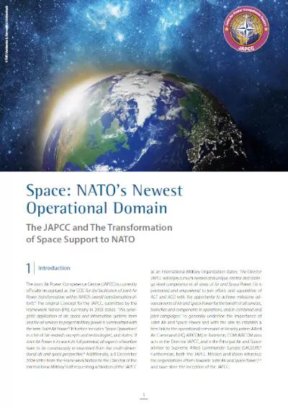Introduction
The Joint Air Power Competence Centre (JAPCC) is currently officially recognized as the COE ‘for the facilitation of Joint Air Power transformation within NATO’s overall transformation efforts’. The original Concept for the JAPCC, submitted by the Framework Nation (FN), Germany in 2003 states: ‘This synergistic application of air, space and information systems from and for all services to project military power is summarized with the term ‘Joint Air Power.’ It further includes ‘Space Operations’ in a list of ‘air-related concepts and technologies’, and states: ‘If Joint Air Power is to reach its full potential, all aspects of warfare have to be continuously re-examined from the multi-dimensional air and space perspective.’ Additionally, a 6 December 2004 letter from the Framework Nation to the Director of the International Military Staff requesting activation of the JAPCC as an International Military Organization states: ‘The Director JAPCC will enjoy a much needed and unique, central and strategic-level competence in all areas of Air and Space Power. He is positioned and empowered to join efforts and capabilities of ACT and ACO with the opportunity to achieve milestone advancements of Air and Space Power for the benefit of all services, branches and components in operations, and in combined and joint campaigns.’ To generally underline the importance of Joint Air and Space Power and with the aim to establish a firm link to the operational command at Headquarters Allied Air Command (HQ AIRCOM) in Ramstein, COM AIRCOM also acts as the Director JAPCC, and is the Principal Air and Space advisor to Supreme Allied Commander Europe (SACEUR). Furthermore, both the JAPCC Mission and Vision reference the organizations efforts towards ‘Joint Air and Space Power’, , and have since the inception of the JAPCC.
Evolution of Space in NATO
During the first decade of this century NATO realized the growing dependence on Space-based assets in executing its missions and operations; especially as lessons learned from ISAF operations in Afghanistan stimulated the establishment of a first working group dealing with Space relevant topics for NATO’s need. Additional shortfalls identified in 2012 Schriever Wargame prompted the founding of the Bi-Strategic Commands Space Working Group (BiSCSWG), tasked by Military Committee (MC) and dealing mainly with tactical and operational aspects of Space Support to Operations. The portfolio of this group was pointed out in a first Programme of Work (PoW), which was updated in an Action Plan for the period from 2017 to 2021. This group, including members from NCS, NATO organizations as well as Space-faring nations, made several important steps for better integration of Space capabilities to the support of NATO operations over time.
JAPCC’s White Paper ‘NATO Space Operations Assessment’, requested by HQ SACT and published in final form in 2009 took a comprehensive look at Space across the Alliance, identified gaps and provided 23 concrete recommendations that have influenced NATO’s Space transformation and the approval of an ‘Overarching Policy for Space’, it’s recognition as a domain of operations, and the publication of an Initial Implementation Plan.
The recognition of Space as an Operational Domain by NATO in December last year put an exclamation point on this evolutionary process; however, it also sets a new starting point for widespread integration of Space-based Data, Products and Services (DPS) into planning and execution of all NATO’s missions, operations and visions.
JAPCC Space Activities Since 2005
Independent from main BISCSWG activities, JAPCC has been extremely active in leading Space thinking throughout its 15-year history, supporting all four pillars of CoE work: Concept Development & Experimentation, Doctrine Development & Standardization, Education, Training, Exercise and Evaluation as well as Analysis and Lessons Learned.
In addition to the volume of analysis and written work, the JAPCC became the Department Head for Education and Training in Space Support in Operations in 2016 and is also the custodian of AJP 3.3, NATO Air and Space Operations doctrine, which includes leading the writing of Chapter 5, Space Operations.
Furthermore, the JAPCC has been providing Space expertise and serving as the Space Red Team Lead to NATO exercises since 2014 through an Agreement with the NATO Joint Warfare Center.
Since 2005 the JAPCC has published, either focused on or with significant sections dealing with Space:
- 50 Journal Articles;
- 10 White Papers;
- 15 Conference Read Ahead Articles;
- 4 JAPCC Flyers (Fact Sheets).
The JAPCC hosted the First-Ever NATO Bi-Strategic Command Space Working Group in 2012.
Space Branch at the JAPCC
In response to evolving Space-related requirements, the JAPCC Sponsoring Nations approved the addition of a fourth Space SME post in June 2019, and subsequently in June 2020 the creation of a separate Space branch, comprised of seven total posts. This Branch will cover the increasing workload resulting from NATO’s recognition of Space as an Operational Domain.
JAPCC Publications and Contact
All Space publications, as well as all other publications of the JAPCC, can be found at
https://www.japcc.org/publications/.
Point of Contacts, as well as Space specifics, are available at https://www.japcc.org/competencies/space/.











